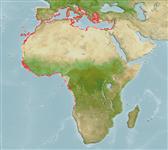| Native range | All suitable habitat | Point map | Year 2100 |

|
| This map was computer-generated and has not yet been reviewed. |
| Oblada melanura AquaMaps Data sources: GBIF OBIS |
Human uses
Fisheries: commercial; gamefish: yes
Phylogenetic diversity index
(Ref. 82805)
PD50 = 1.0000 many relatives (e.g. carps) 0.5 - 2.0 few relatives (e.g. lungfishes)
Trophic Level
(Ref. 69278)
3.4 ±0.35 se; Based on food items.
Resilience
(Ref. 69278)
Medium, minimum population doubling time 1.4 - 4.4 years (tm=2-4; tmax=11; K=0.20)